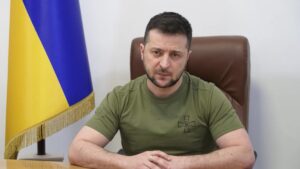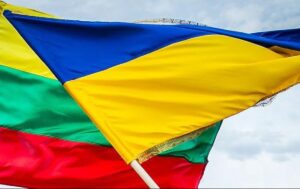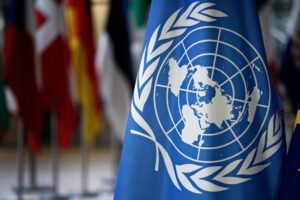
Of the 39 domestic cardboard and paper enterprises that have installed paper or cardboard machines, 23 have completely stopped their production, the rest are not working at full capacity, the UkrPapir Association told Interfax-Ukraine.
“Due to well-known circumstances, industry enterprises in the Lugansk, Kherson, Chernigov, Donetsk regions, where hostilities are taking place, as well as in the Crimea, do not work today. Enterprises that continue their production activities in difficult conditions are located in Kiev, Lvov, Volyn, Dnepropetrovsk, Khmelnitsky, Rivne, Odessa regions,” the association noted, without naming the specific names of the enterprises.
According to the interlocutor of the agency, the association continues to communicate with leading European and world companies whose activities are related to the pulp and paper industry, urging them to condemn the barbaric actions of “Putin’s bandits” in the temporarily occupied territory of Ukraine and stop all business contacts with the aggressor countries – Russia and Belarus.
“Certain results have been achieved – some foreign manufacturers of cardboard and paper products and chemical components have already terminated contracts with consumers of their products in the country of the aggressors. Sanctions are already in effect. pulp and paper, which are inferior to the quality of the previously manufactured products of the plant, while losing nominal profit. There was a shortage of cut paper for office equipment in the retail chains of the Russian Federation, its cost increased while the quality decreased,” the source said.
Among the companies that supported Ukraine in its fight against the aggressor, the association named well-known world manufacturers Kemira, Stora Enso, UPM Kymmene.
Association “UkrPapir” today unites 33 enterprises and companies, in particular 19 manufacturers of cardboard and paper products, including notebooks, paper wallpapers and printing enterprises, as well as 12 distributors and 2 suppliers and suppliers of waste paper.

Ukraine will not be a “liberal” state in the near future, and security will become the number one priority, President of Ukraine Volodymyr Zelensky said in an interview with Ukrainian journalists shown on Tuesday as part of the all-Ukrainian telethon.
“Ukraine will definitely not be the one we wanted from the very beginning. It’s impossible. Absolutely liberal, European – it will not be like that. It will definitely come from the fortress of every hut, every house, every person,” he said. “We will become a “greater Israel” with our own face. We will not be surprised if there are representatives of the Armed Forces or the National Guard in our cinemas, supermarkets, people with weapons will stand. I am sure that the issue of security will be number 1 for us in the next 10 years. I am sure of this,” Zelensky said, adding: “The state will be the way the Russian Federation made it.”
At the same time, he noted, such a state would be democratic. “An authoritarian state is impossible in Ukraine. An authoritarian state would lose to Russia. People know what they are fighting for. They come out and fight not for a portrait,” said the President of Ukraine.

The Lithuanian Ambassador to Ukraine will resume work in Kyiv, Lithuanian Foreign Minister Gabrielius Landsbergis said.
“Russian ambassador was asked to leave Lithuania. Lithuanian ambassador in Ukraine is coming back to Kyiv. That is the Lithuanian decision made today,” he said on Twitter on April 4.

Prime Minister of Ukraine Denys Shmyhal says that more than 150,000 businesses are already switching to a new taxation system – 2% of turnover.
“More than 150,000 businesses are already switching to the new taxation system – 2% of turnover,” Shmyhal said in his address on Monday evening.
Also, according to him, the authorities have already received 1,500 applications for the relocation of Ukrainian manufacturing enterprises, and more than 100 enterprises have already moved and are working.
“The sowing campaign has begun. Now it goes to almost all regions of the country. There are seeds, fertilizers, fuel. The state provided farmers with funding for more than UAH 20 billion. Loans for everyone at 0%,” he said.

Losses among civilians from February 24, when Russia started the war against Ukraine, until 24:00 on April 3, 2022, amounted to 3527 civilians (3455 in the report a day earlier), including 1430 dead (1417), reports the Office of the UN High Commissioner for human rights on Monday.
“OHCHR believes that the actual figures are much higher as information is delayed from some areas of intense fighting and many reports are still awaiting confirmation,” the document says.
According to him, this applies, for example, to Mariupol and Volnovakha (Donetsk region), Izyum (Kharkiv region), Popasna (Luhansk region), Irpin (Kyiv region), where there are reports of numerous civilian casualties. They are subject to further verification and are not included in the above statistics.
“The majority of civilian deaths or injuries were caused by the use of explosive devices with a wide area of effect, including shelling from heavy artillery and multiple launch rocket systems, as well as rocket and air strikes,” the report says.
According to confirmed UN data, 297 men, 202 women, 40 boys and 22 girls died, while the sex of 59 children and 810 adults has not yet been determined.
Among the 2,097 injured, 42 are girls and 38 boys, as well as 98 children whose gender has not yet been determined.
Compared to the previous day, seven children were injured, according to the UN.
OHCHR indicates that in Donetsk and Luhansk regions, as of midnight on April 4, there were 405 (401) dead and 793 (784) injured in government-controlled territory, and 67 (67) dead and 253 (252) injured in territory controlled by self-proclaimed “republics”.
In other regions of Ukraine under government control (in Kyiv, as well as in Zhytomyr, Zaporozhye, Kiev, Sumy, Odessa, Mykolaiv, Kharkiv, Kherson, Dnipropetrovsk, Cherkasy and Chernihiv regions), the UN recorded 958 (949) dead and 1051 (1002) injured .
The report also states that, according to the Office of the Prosecutor General of Ukraine, as of 08:00 on April 4, 161 (158) children were killed and 264 (258) were injured.
The increase in indicators in this report compared to the figures in the previous report should not be attributed only to new cases that occurred on April 3, since OHCHR also verified a number of cases that occurred in previous days during the day, the document specifies.
Main trade partners of Ukraine in % from total volume (import from other countries to Ukraine) in 2021

SSC of Ukraine